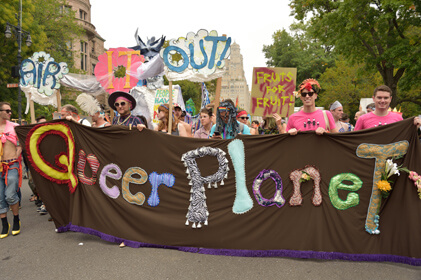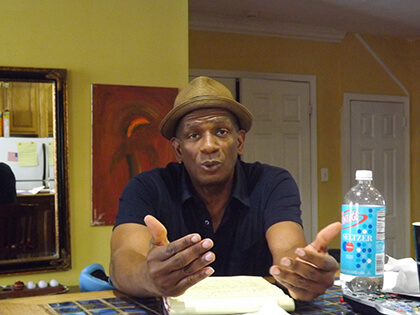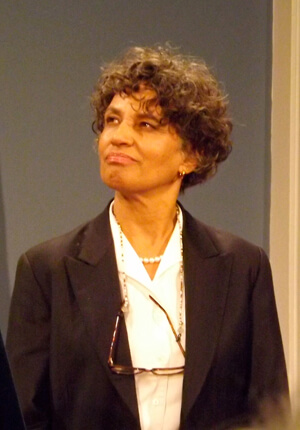Vanessa Ho in Manhattan on June 27. | GAY CITY NEWS
On June 16, Vanessa Ho, who works on behalf of sex workers’ rights in Singapore, was among 11 advocates for sexual minorities who arrived in Washington under the auspices of the State Department for a three-week tour of the US. The advocates, who traveled as well to New York and two other cities, were here as part of a human rights and gender identity project of the department’s International Visitor Leadership Program and represented Azerbaijan, India, Israel, Mexico, Nigeria, Romania, Turkey, Uganda, Vietnam, and Zimbabwe, as well as Singapore.
Ho is the program coordinator of Project X, a social initiative to end discrimination against sex workers in her home country. Project X is a small organization that does community outreach to identify sex workers, traveling to red light districts and also going online. The group hands out condoms, lubricants, wet wipes, health guides, and human rights information and offers free HIV and STD check-ups, aiming to develop close relationships of trust with sex workers who often work in the shadows, vulnerable to harassment both official and otherwise.
“We introduce ourselves and ask them if they need any help,” Ho explained. “We set up these relationships, that way they feel comfortable in telling us if their rights have been violated in any ways.”
Vanessa Ho travels to New York, DC, San Diego, and Alabama as part of State Department gender identity project
Most of what Project X focuses on is human rights documentation. That involves explaining what rights sex workers have in Singapore and making a record of what they consider human rights violations.
Ho did not always aim for a career in social advocacy. She has a master’s degree in Gender, Society and Representation from University College London, but chose to forgo a civil service career for a life of activism. Once she returned to Singapore after completing her degree, she held a teaching position, attended a wide array of networking events, and made a lot of contacts, including the founder of Project X. She didn’t join the group right away, but took over when the founder stepped down in 2011.
“It’s not a very exciting story about how I got engaged,” Ho said, with a smile. “I really just needed a job. I knew that I wanted to work at a nonprofit and I was really fortunate to meet the founder of the project, and when she retired she asked me to take over. I’m kind of living out the cliché of a gender studies student.”
Most sex workers in Singapore do the work illegally. There is a small population of licensed sex workers who operate out of brothels, which are immune from police raids — though the state will not acknowledge the existence of such a legalized trade. Most of those working illegally do it on the street or through the Internet. Project X advocates for their safety from abusive clients and from passersby who will subject sex workers to verbal abuse — in the form of vulgarities and degrading slurs — when they encounter them.
Violence is rare in Singaporean society, but the harassment can do psychological damage, Ho said. And because unlicensed sex workers compete with those officially sanctioned, the harassment can also come from the police.
Even licensed workers are subject to having their human rights abused. Almost 90 percent of sex workers in Singapore are migrants from elsewhere in Southeast Asia, Ho said. After their contract is up at the brothel that employs them, these migrant workers are often deported and put on a travel ban so they can’t re-enter the country.
“Another thing is that trans women who are pre-op or non-operative are not allowed to work in these brothels,” Ho added. “It has to say female on the identification card, and they are only allowed to change their identification card after they have completed the entire gender reassignment surgery.”
Ho works with a lot of sex workers who are a part of the LGBT community. Eighty percent of the people Project X works with are tans women, and some are gay and lesbian sex workers.
“Which is why I guess they picked me for this program,” she said.
Singapore continues to maintain its British colonial era sodomy statute on the books, Ho explained, though social and official attitudes toward homosexuality have liberalized significantly in recent decades. Still, the changes are informal. Political organizing and assembly remain subject to very tight government controls. Pride celebrations in Singapore require government permits and stay away from overt expressions of politics.
The State Department’s International Visitor Leadership Program’s human rights and gender identity project took its 11 international visitors to four US cities that offered the advocates networking opportunities with American counterparts. In addition to Washington and New York, they traveled to San Diego and Huntsville, Alabama.
Ho had the chance to meet with other advocates for sex workers and also attended a number of Pride events.
“It’s been really great just meeting all these people, and seeing these organizations that are working toward the same thing most of us in the program work on back home,” she said. “One of my favorite moments was when we met with Spirit of the Cross, which is a gay church in Huntsville. It was quite an amazing thing to see that environment in Alabama.”



































